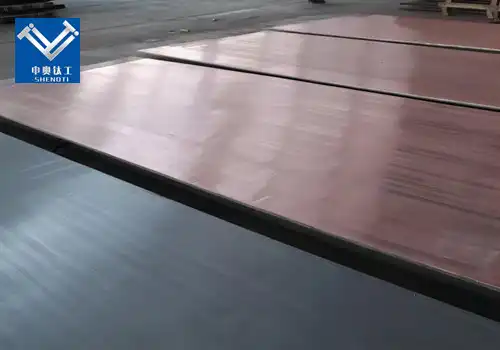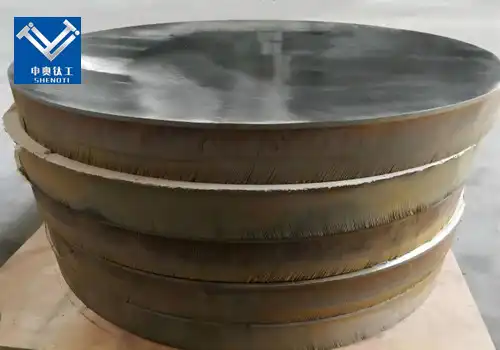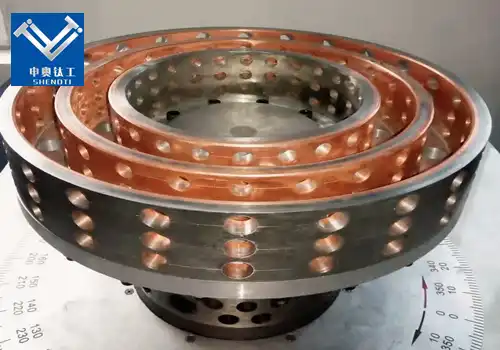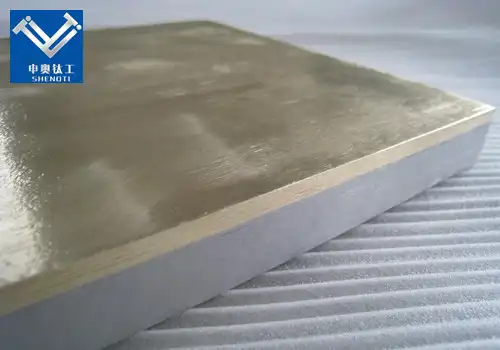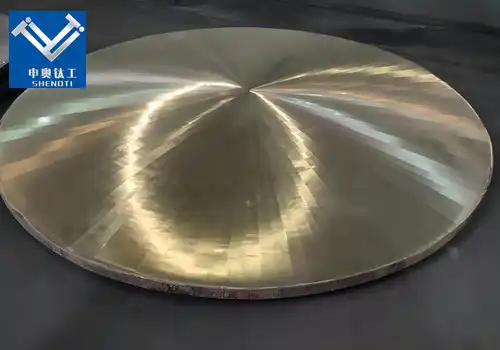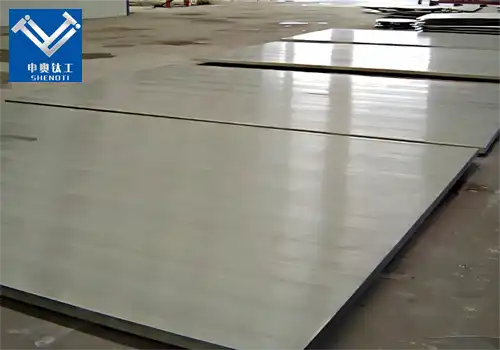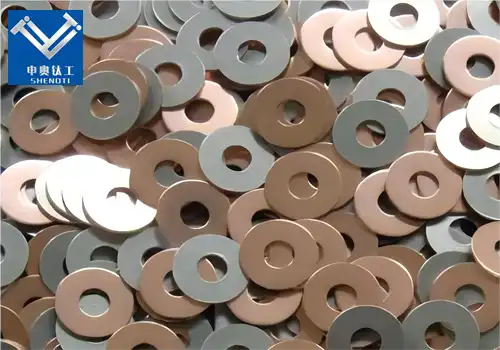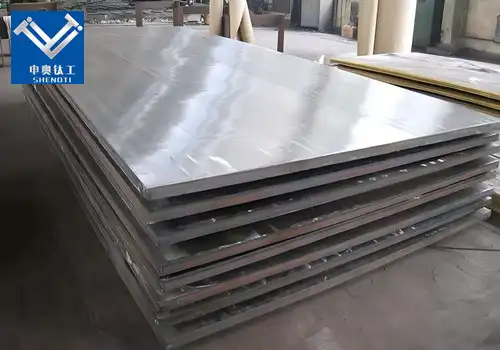
Core Advantages of Using Titanium Alloy Steel Clad Plate
2025-07-09 15:10:19
Why Choose Titanium Alloy Steel Clad Plate?
In the evolving world of advanced materials, Titanium alloy steel clad plate has emerged as a key solution in various demanding industrial sectors. This composite material, which combines the corrosion resistance of titanium alloys with the mechanical strength of carbon or stainless steel, offers a powerful blend of performance, cost-efficiency, and longevity.
What Is a Titanium Alloy Steel Clad Plate?
A Titanium alloy steel clad plate is a type of bimetallic composite that joins a titanium alloy layer with a steel substrate through methods such as explosion bonding, hot rolling, or diffusion welding. The outer layer of titanium alloy provides corrosion resistance and high-temperature stability, while the steel base offers strength and structural support.
Titanium Alloy Steel Clad Plate Key Characteristics
Corrosion resistance: Excellent resistance to seawater, acids, and alkalis.
High strength-to-weight ratio: Ideal for weight-sensitive applications.
Thermal stability: Withstands high operational temperatures.
Mechanical bonding: Superior interlayer strength via advanced metallurgical processes.
Core Advantages of Using Titanium Alloy Steel Clad Plate
1. Cost-Effective Alternative to Solid Titanium
Pure titanium is expensive. However, Titanium alloy steel clad plates reduce costs by using titanium only where needed—on the exposed surfaces—while using steel as the main structural component. This makes them a highly cost-effective material without compromising performance.
2. Superior Corrosion Resistance
Titanium alloys (such as Ti-6Al-4V or Gr.2) exhibit exceptional corrosion resistance in harsh environments like chemical processing plants, offshore oil rigs, and desalination facilities. Cladding these alloys onto steel allows the entire structure to resist aggressive substances, including:
Hydrochloric acid
Chlorides in seawater
Sulfuric acid and nitric acid
Oxidizing and reducing agents
3. Enhanced Mechanical Properties
With Titanium alloy steel clad plate, users benefit from the high mechanical strength of steel, coupled with the corrosion-resistant surface of titanium. This makes it suitable for pressure vessels, reactors, heat exchangers, and pipelines under high pressure and temperature conditions.
Applications of Titanium Alloy Steel Clad Plate Across Industries
1. Chemical and Petrochemical Industry
In chemical processing, reactors, storage tanks, and pipelines are routinely exposed to corrosive media. Titanium alloy steel clad plates serve as ideal materials for:
Urea synthesis towers
Acetic acid reactors
Sulfuric acid coolers
Chlor-alkali equipment
2. Desalination and Seawater Treatment
Seawater desalination requires materials that can endure continuous exposure to saltwater and biofouling. Titanium alloy steel clad plate is perfect for:
Brine heaters
Heat exchangers
Seawater pipelines
Evaporator chambers
3. Aerospace and Defense Applications
Titanium alloys are valued in aerospace for their strength-to-weight ratio and corrosion resistance. Clad plates offer cost savings for non-flight-critical parts, such as:
Launch pad structures
Ground support equipment
Military-grade pressure containers
4. Nuclear and Energy Sectors
In nuclear and power plants, reliability is non-negotiable. Titanium alloy steel clad plates are utilized in:
Condenser tubing
Heat recovery steam generators (HRSGs)
High-pressure containment systems
How Are Titanium Alloy Steel Clad Plates Manufactured?
1. Explosion Bonding
One of the most popular methods, explosion bonding, uses controlled explosive energy to weld a titanium alloy plate to a steel substrate. This solid-state process creates a strong metallurgical bond without melting the materials.
2. Hot Rolling Cladding
In this process, a titanium alloy layer is bonded to steel under high temperature and pressure. It offers excellent bonding quality and is suitable for large-scale production.
Technical Specifications and Material Grades
1: Common Titanium Alloys Used
Grade 1 Titanium (UNS R50250) – Commercially pure, excellent formability and corrosion resistance.
Grade 2 Titanium (UNS R50400) – The most widely used grade for clad plates.
Ti-6Al-4V (Grade 5) – A high-strength, heat-treatable alloy used in aerospace.
2: Typical Steel Substrates
Carbon steel (Q235, Q345, ASTM A516 Gr70)
Stainless steel (304, 316L, 321)
Alloy steel (Cr-Mo steel, etc.)
Quality Control and Testing Methods
Ensuring the integrity of Titanium alloy steel clad plate requires rigorous quality control. Standard tests include:
Ultrasonic Testing (UT): Detects internal defects or voids in the bonding layer.
Shear Strength Test: Confirms bonding force exceeds minimum industrial standards (generally ≥130 MPa).
Bend Test: Verifies mechanical flexibility and ductility.
Metallographic Examination: Inspects bonding interface for uniformity.
All procedures typically comply with standards such as:
ASTM B898
ASME SB-265
GB/T 8547
JB/T 4744
2: Choosing a Reliable Manufacturer for Titanium Alloy Steel Clad Plate
Selecting a trustworthy manufacturer ensures material consistency, bonding strength, and compliance with international standards. Look for suppliers with:
In-house explosion bonding or rolling mills
ISO 9001, ASME, or PED certifications
Full traceability of raw materials
Customizable dimensions and surface treatments
Prompt delivery and technical support
A reliable partner will offer not only Titanium alloy steel clad plates but also integrated services including cutting, bending, and welding.
Titanium Alloy Steel Clad Plate for Long-Term Performance and Cost Efficiency
The Titanium alloy steel clad plate represents a modern engineering solution that bridges the gap between performance and affordability. With its remarkable resistance to corrosion, excellent mechanical strength, and flexible manufacturing options, it continues to revolutionize construction in high-stress, corrosive environments.
If your project demands durability, safety, and cost-efficiency, it's time to consider the unmatched benefits of Titanium alloy steel clad plates.
Contact Us
Baoji City ShenAo Metal Materials Co., Ltd.
Address: Baoji, Shaanxi Province, China
Email: zh@baojiti.com.cn
Website: shenaocladplate.com
We specialize in the manufacturing of Titanium alloy steel clad plates, explosion bonded materials, and custom metal composites. Contact us today to discuss your project needs or request a free quote.
YOU MAY LIKE











